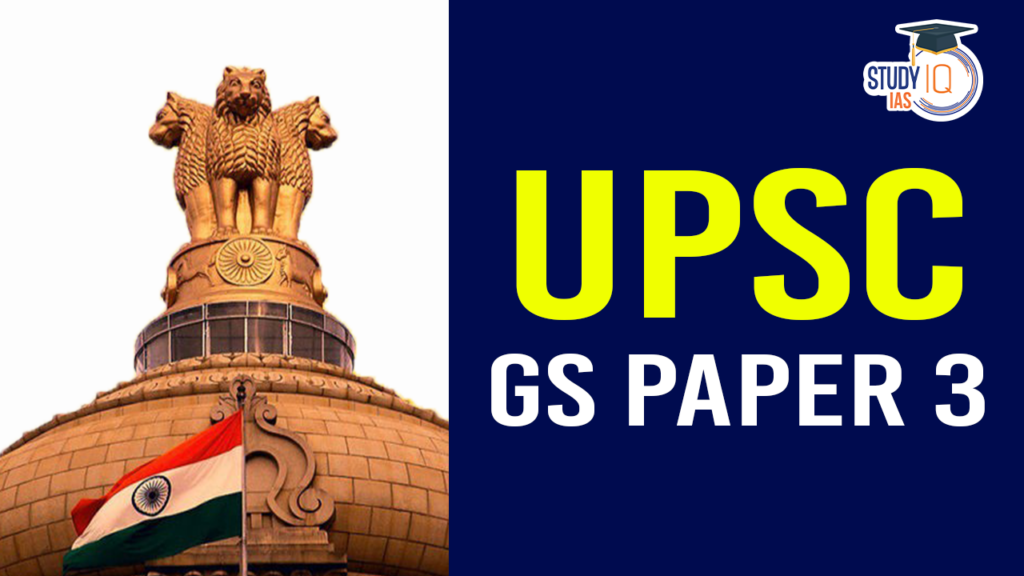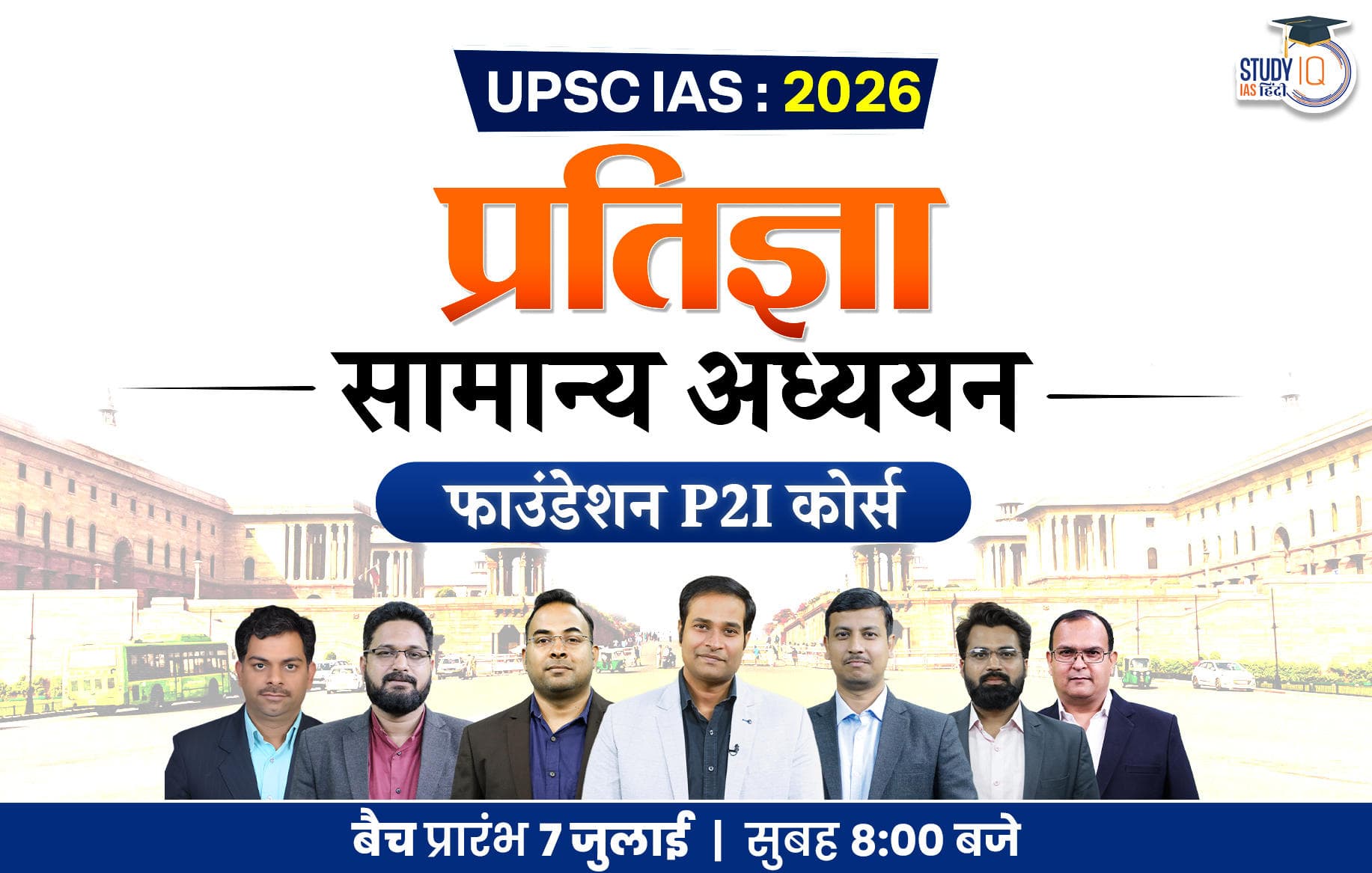
UPSC Mains GS Paper 3
The GS 3 Syllabus is focussed on the following subjects:
- Indian Economy and Economic Development
- Agriculture and its Related Issues
- Science and Technology
- Environment and Ecology
- Internal Security and
- Disaster Management
Strategy for Preparing UPSC GS Paper 3 Syllabus
The Detailed UPSC GS Paper 3 Syllabus have been discussed below in this table for the easy reference of the candidates:
| UPSC GS Paper 3 Syllabus | |
| GS Paper 3 Sections | Detailed Syllabus |
| Indian Economy & Economic Development |
|
| Agriculture |
|
| Science & Technology |
|
| Environment & Ecology |
|
| Internal Security |
|
| Disaster Management |
|
Indian Economy and Economic Development
- Current Affairs
- Class 12 NCERT – ‘Introductory Macroeconomics’
- Economic Survey of India and India Year Book
Agriculture and Related Issues
- To prepare the Agriculture paper, you should study the topic thoroughly and do note-taking. Keep up with recent events—discussions about minimum support prices and the subsidies paid to farmers in the agriculture sector.
- The Hindu newspaper or The Indian Express newspaper will provide you with various points of view on Agriculture and its related issues, mostly the Editorials of The Hindu and Indian Express and the Explained section of Indian Express.
- You will learn a great deal about the subject and be able to provide insightful answers if you approach your studying methodically.
Science and Technology
Environment and Ecology
Internal Security and Challenges Associated
Disaster Management
- Current Affairs
- Yojana (January 2017) edition- This covers Disaster Management perspectives.
UPSC GS Paper 3 Trend Analysis
From the perspective of the UPSC examination, understanding trend analysis is an essential skill for students taking the Mains GS Paper 3. The following key elements highlight the significance of trend analysis for the examination:
- Candidates can successfully grasp and assess any economic, social, or political situation by being aware of the trends. The trend analysis can shed light on the long-term tendencies in different economic sectors, which can aid in the understanding of the current situation.
- Making future predictions can be aided by understanding the trends. Candidates can forecast the course of the economy, society, or politics by examining the trends, which is crucial from the perspective of policymakers.
- The student can provide more useful answers to their inquiries if they have knowledge and experience in trend analysis. If candidates can accurately identify and comprehend the trends, many questions in the GS Paper 3 will be simple to answer.
- Questions regarding the long-term trajectory of several significant statistics, such as GDP, inflation, unemployment, poverty level, etc., are frequently asked by the UPSC. Answering these questions requires an understanding of these developments.
- All of these justifications highlight how crucial it is to comprehend trend analysis in the Mains GS Paper 3 from the perspective of the UPSC paper exam. Candidates who can read trends clearly have a better chance of passing the exam and becoming effective policymakers.
UPSC GS Paper 3 Previous Year Question Trends Analysis
Candidates who have started their preparation for the UPSC Examination can check the UPSC GS Paper 3 Previous Year Question Trends Analysis for a better understanding of the questions asked from UPSC GS Paper 3 in the mains examination:
UPSC GS Paper 3 Questions – Indian Economy and Economic Development
Check the Number of questions and marks asked from GS 3 Questions – Indian Economy and Economic Development from the table below:
| Year | Number of Questions | Total Marks |
| 2013 | 8 | 70 |
| 2014 | 7 | 87.5 |
| 2015 | 6 | 62.5 |
| 2016 | 6 | 75 |
| 2017 | 6 | 75 |
| 2018 | 5 | 50 |
| 2019 | 4 | 50 |
| 2020 | 4 | 50 |
| 2021 | 5 | 70 |
UPSC GS Paper 3 Questions – Agriculture and Related Issues
Check the Number of questions and marks asked from GS 3 Questions – Agriculture and Related Issues from the table below:
| Year | Number of Questions | Total Marks |
| 2013 | 4 | 40 |
| 2014 | 2 | 25 |
| 2015 | 2 | 50 |
| 2016 | 3 | 50 |
| 2017 | 4 | 50 |
| 2018 | 4 | 65 |
| 2019 | 4 | 55 |
| 2020 | 4 | 50 |
| 2021 | 4 | 55 |
UPSC GS Paper 3 Questions – Science & Tech/ Environment/ Disaster Management
Check the Number of questions and marks asked from GS 3 Questions – Science & Tech/ Environment/ Disaster Management from the table below:
| Year | Number of Questions | Total Marks |
| 2013 | 9 | 85 |
| 2014 | 6 | 75 |
| 2015 | 8 | 75 |
| 2016 | 7 | 75 |
| 2017 | 5 | 75 |
| 2018 | 8 | 100 |
| 2019 | 8 | 100 |
| 2020 | 8 | 100 |
| 2021 | 8 | 75 |
UPSC GS Paper 3 Questions – Internal Security
Check the Number of questions and marks asked from GS 3 Questions – Internal Security from the table below:
| Year | Number of Questions | Total Marks |
| 2013 | 5 | 55 |
| 2014 | 3 | 62.5 |
| 2015 | 4 | 62.5 |
| 2016 | 4 | 50 |
| 2017 | 4 | 50 |
| 2018 | 3 | 40 |
| 2019 | 4 | 45 |
| 2020 | 4 | 50 |
| 2021 | 3 | 45 |
Comparison of Mains 2021 and 2022 GS Paper 3
Many candidates found the trend analysis of Mains GS Paper 3 from the prior year to be eye-opening. The paper’s main issues were security and disaster management, environmental ecology and biodiversity, and economic and social growth. There was a noticeable change in the relative importance of the topics, with a stronger focus on modern problems including cyberterrorism, artificial intelligence, and space technology.
- Traditional topics including agriculture, manufacturing, and services nevertheless continued to be important.
- A thorough evaluation of the candidate’s understanding was ensured by the multidimensional method utilized in question framing.
- The purpose of the article was to evaluate how well various topics could be integrated and used in practical contexts.
- A candidate would do well if they were able to critically and from various angles examine existing situations and offer workable remedies.
| UPSC GS Paper 3 – Section | Mains Question in 2021 – Topics | Mains Question in 2022 – Topics |
| Disaster Management |
|
|
| Indian Economy & Economic Development Agriculture |
|
|
| Environment & Ecology |
|
|
| Internal Security |
|
|
| Science and Technology |
|
|
Must-Read Important Topics in GS-III for UPSC
The table below mentions the GS-III topics that are important for the UPSC CSE Exam:
| Important Topic for UPSC GS Paper 3 | |
Indian Economy
|
Inclusive Growth
|
Budgeting
|
Major Crops
|
Subsidies, Agriculture
|
Food Processing
|
Land Reforms
|
Liberalization
|
Infrastructure
|
Investment
|
Science & Technology
|
Environment
|
Disaster Management
|
Security
|
UPSC IAS Exam Pattern
Check the table below to understand the scheme and subjects of the IAS examination:| UPSC IAS Exam | Pattern of IAS Exam |
| Preliminary Examination |
|
| Mains Examination |
|
| Personality Test | – |
Books for GS Paper 3
The following books should be used to prepare for the GS 3 paper.
- NCERT Class X – Understanding Economic Development
- NCERT Class XI – Indian Economic Development
- NCERT Class XII – Macroeconomics
- Indian Economy for Civil Services Examinations by Study IQ
- Environment and Ecology by Study IQ
- Agriculture by Study IQ
- Science and Technology by Study IQ
- Disaster Management notes – IGNOU
- Cyber Security notes – IGNOU
- NITI Aayog Reports
- India and Year Book
- Lok Sabha Question-Answers






















